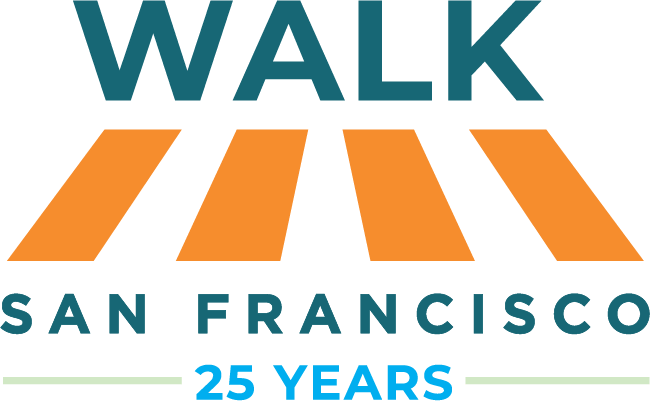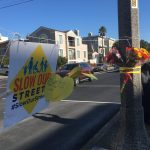We will not stop pushing for a Market Street that prioritizes safety
Here at Walk SF, we continue to be deeply concerned about the proposed new plan for Market Street.
We’re not alone. Many of you have joined us in asking city leaders to stay true to the original vision for a people-first promenade that prioritizes safety. Thank you.
The city’s official survey is now closed and there are no more public meetings regarding the proposed new plan for Market Street.
That’s why earlier this week, Walk SF sent a second joint letter with the San Francisco Bicycle Coalition and San Francisco Transit Riders to SFMTA Director Tumlin and DPW Director Alaric Degrafinried with new details regarding our concerns. Read on.
To Directors Jeffrey Tumlin and Alaric Degrafinried:
The project team has now completed a month of outreach, and the response from our members and the general public is clear: The revised proposal for Phase 1 of Better Market Street fails to meet the original project goals of improving safety, comfort and mobility for people who bike, walk and ride transit.
First, we believe that your respective departments, SF Public Works and the SF Municipal Transportation Agency, waited too long to share this revised proposal with the public, eroding trust and confidence after spending years in the design, outreach and approval process.
Furthermore, we believe your departments have withheld critical information about the original design approved in October 2019. City planners first unveiled this original design in July 2017 and held countless CAC meetings, workshops and open houses before the 2019 approval, yet only now is it being referred to as over-budget and insufficient in handling the projected increase in biking.
As representatives of the San Francisco Bicycle Coalition, SF Transit Riders and Walk San Francisco, we cannot support the revised proposal that has been presented to the public at the virtual open house. Again, we recognize the resource constraints that have been presented. Yet, we believe that City planners can work within those constraints. We are asking that you return with significant design changes that meaningfully address the concerns detailed below:
- Outreach: It is clear that the outreach performed by both your agencies has been inadequate and rushed. The timeframe for the virtual open house has changed multiple times, and a survey was not released until days after the website launched. We have serious concerns that key stakeholders who have been part of the decade-long planning process have not been given a chance to participate, including small business owners, surrounding communities of concern in the Tenderloin and South of Market neighborhoods, transit riders, and more. We ask that you rebuild trust by being fully transparent and honest about the purpose of outreach and demonstrate how the City will be responsive to the overwhelming negative feedback you have received thus far.
- Intersection improvements: Our city’s most dangerous intersections are within Phase 1, yet no additional improvements have been suggested that focus on improving pedestrian and bicycle safety at intersections. We want to see plans that incorporate traffic signals, turn restrictions, and Vision Zero Quick-Build tools that can be made to increase pedestrian safety. We are asking for a comprehensive look at slowing down vehicle traffic that crosses Market and tools to keep crosswalks clear.
- Private auto restrictions: We know that drivers are not following the private auto restrictions that went into effect in January 2020. The City must produce a plan with solutions that do not rely on traffic enforcement to immediately increase compliance with the restrictions.
- Curb management strategy: The City must focus on a curb management strategy for deliveries that acknowledges the rise in package delivery with clear time-based restrictions on all deliveries. The City must also explore creative solutions with taxis that maintain curb access and priority for people with disabilities but limit the number of taxis driving in the curb lanes.
- Transit: We remain unconvinced that the plan for public transit on Market Street provides adequate capacity based on January 2020 ridership levels this is especially troubling in light of the vulnerability of this plan to bus or trolly breakdowns, increased dwell times to accommodate riders with accessibility needs, and projected increases caused by other proposed policy changes. The City must outline proposed solutions to transit congestion and outline mitigation strategies for potential bus or train breakdowns.
- Full project phasing & funding: As Phase 1 of the project moves forward within the curb lines, we ask to see a timeline, a more realistic budget and funding sources for future phases. This is needed to rebuild trust and ensure that Better Market Street will continue to build toward its original goals. We recognize that developing concepts and then designing and approving additional changes will require additional investments, but given the cost savings with the revised proposal, we believe that this is the only path our City planners can take.
We appreciate your attention to this letter and look forward to continuing to work with you and the project team to construct a Better Market Street that we are all proud of.
Sincerely,
Jodie Medeiros, Executive Director, Walk San Francisco
Brian Wiedenmeier, Executive Director, San Francisco Bicycle Coalition
Mark Cordes, Executive Director, San Francisco Transit Riders
Walk SF will not stop pushing for a Market Street that prioritizes safety. Especially when getting this right could make Market Street a building block to our city’s post-COVID recovery.
Sign up to be the first to hear any updates on our Market Street campaign.




